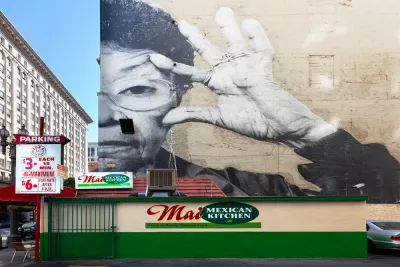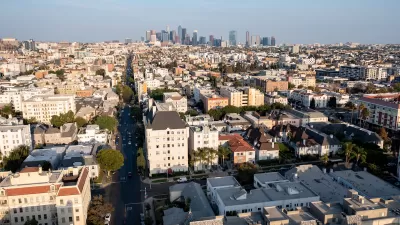Cecilia Estolano, former Executive Director of Los Angeles’s Community Redevelopment Agency, diagnoses why the region has been unable to provide housing for working-class citizens.

Los Angeles is mired in an affordable housing crisis, with two philosophies facing off via citizen ballot-box initiatives. On one side are those pushing to build more units, and on the other side are those trying to save affordable units, especially rent-stabilized apartments. To better understand how workforce and working-class housing has continuous been dismissed by city leaders, The Planning Report sat down with Cecilia V. Estolano, an expert in sustainable economic development and urban revitalization.
Estolano, co-founder of ELP Advisors and former leader of the Los Angeles’s Community Redevelopment Agency, helps to oversee local governments like the Westside Cities Council of Governments, non-profits, and foundations on redevelopment dissolution and economic revitalization.
When discussing Los Angeles’ prognosis, Estolano explains, “Los Angeles is not a city that actually believes in planning. It doesn't respect community plans...Comprehensive planning around a district or a community area is what it’s going to take to achieve our sustainability goals in Los Angeles.”
Estolano provides some tangible solutions to addressing the housing shortage. In addition to believing that it would take regulatory reform, entitlement-processing reform, and an accelerated “genuine community planning process” to start to addressing the root of Los Angeles’ housing woes, she provides three tangible examples of ways to make progress:
“Number one: We need a permanent source of money to help fill the gap for low-income housing, specifically.
Number two: We need a much easier process for doing infill housing. Folks have been talking about this for years; The Planning Report has certainly followed it.
I think one of the most exciting prospects right now is the state legislation that was just approved for accessory dwelling units (ADUs). It’s really the easiest and least painful way to increase our supply of workforce housing, and it might be a way to fill in that middle gap that nobody’s addressing right now.”
Looking even deeper at the issues of equitable economic development, job availability, and technical education in Los Angeles, Estolano also shares news about her project to launch a Biotech Leaders Academy in East Los Angeles, using grant funding and industry internships.
Read more about solutions to LA’s affordable housing shortage and the Biotech Leaders Academy in The Planning Report.
FULL STORY: Cecilia Estolano: Why New Affordable Housing Draws the Short Straw in Los Angeles

Study: Maui’s Plan to Convert Vacation Rentals to Long-Term Housing Could Cause Nearly $1 Billion Economic Loss
The plan would reduce visitor accommodation by 25,% resulting in 1,900 jobs lost.

North Texas Transit Leaders Tout Benefits of TOD for Growing Region
At a summit focused on transit-oriented development, policymakers discussed how North Texas’ expanded light rail system can serve as a tool for economic growth.

Using Old Oil and Gas Wells for Green Energy Storage
Penn State researchers have found that repurposing abandoned oil and gas wells for geothermal-assisted compressed-air energy storage can boost efficiency, reduce environmental risks, and support clean energy and job transitions.

Private Donations Propel Early Restoration of Palisades Playground
Los Angeles has secured over $1.3 million in private funding to restore the Pacific Palisades playground months ahead of schedule, creating a modern, accessible space that supports community healing after recent wildfires.

From Blight to Benefit: Early Results From California’s Equitable Cleanup Program
The Equitable Community Revitalization Grant (ECRG) program is reshaping brownfield redevelopment by prioritizing projects in low-income and environmental justice communities, emphasizing equity, transparency, and community benefits.

Planting Relief: Tackling Las Vegas Heat One Tree at a Time
Nevada Plants, a Las Vegas-based nonprofit, is combating the city’s extreme urban heat by giving away trees to residents in underserved neighborhoods, promoting shade, sustainability, and community health.
Urban Design for Planners 1: Software Tools
This six-course series explores essential urban design concepts using open source software and equips planners with the tools they need to participate fully in the urban design process.
Planning for Universal Design
Learn the tools for implementing Universal Design in planning regulations.
Ascent Environmental
Borough of Carlisle
Institute for Housing and Urban Development Studies (IHS)
City of Grandview
Harvard GSD Executive Education
Toledo-Lucas County Plan Commissions
Salt Lake City
NYU Wagner Graduate School of Public Service





























